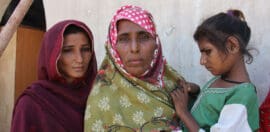Save the Children launches first-of-its kind digital program for vulnerable Fijians

19 January 2021 at 8:17 am
The charity’s $6.6 million digital cash program is the largest humanitarian cash transfer in Fiji’s history in the region
Fijian households are receiving digital cash payments to help them pay for basic necessities, in a new program that charity leaders say could permanently transform the way aid is delivered in the region.
The program, delivered in partnership by Save the Children Australia and Vodafone, will use the phone company’s Mpaisa platform to transfer $100 FJD to pre-selected households once a month for four months.
Paul Ronalds, the CEO of Save the Children Australia, said that using mobile technology to transfer money to vulnerable families at scale was a game changer.
“This kind of technology has the ability to transform the way we help people in the aftermath of disasters, and in the most efficient and dignified manner possible.
He said that cash and vouchers programs were increasing in popularity due to their effectiveness, fast deployment, and the dignity of cash and voucher programs were some of the reasons they were rising in popularity.
“We can distribute very large amounts of humanitarian support to beneficiaries with very low overhead… we can get that money out to [beneficiaries] very quickly so that families can start spending that money, which obviously has a huge ripple effect on the local economy,” Ronalds said.
“It’s also more dignified because it actually allows beneficiaries to decide what’s important from their family’s perspective. Is it education? Is it health care? Is it basic food?”
He said that industries such as tourism in the Pacific had been hit hard by COVID, and it was important for wealthy neighbouring countries to step up and help by embracing technology.
“That loss of income for so many families right across the Pacific is going to significantly increase poverty unless Australia and other wealthy neighbors directly intervene,” he said.
“We’ve long been calling for a Pacific JobKeeper type of social protection to support vulnerable households among our Pacific neighbours, and this technology shows how such a system could work.”
About 4,000 households have already received the payment directly to their mobile phones, and when fully rolled out the program will reach around 14,000 families.
The charity has worked closely with local Fijian NFPs including the Fiji Council of Social Services to seek out the families that need the payments the most.
It is hoped the technology can also be used to support communities affected by disasters like earthquakes and cyclones.
Charities must embrace changing landscape
Ronalds also said that with humanitarian technology making it so much easier to deliver effective aid, it was critical charities embraced the changes that were coming their way.
“Unless charities are becoming really digitally literate, they are going to be increasingly left behind and they’re not going to be fulfilling their mission for beneficiaries because they just won’t be providing support in the most efficient and effective way possible,” he said.








